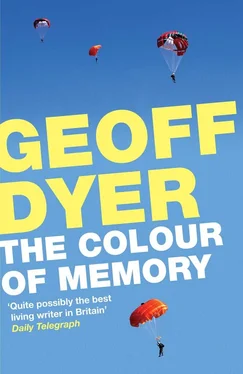I was still staring out of the window when, suddenly, everywhere was plunged into darkness. The ringing of burglar alarms died instantly. In place of the faint rust-coloured glow that had hung over the city there was only deep night. Next day the air was fresh as a shaved face; the walls of buildings looked sore and clean as if a layer of dirt had been razored off by the wind. Uprooted trees were everywhere, scattered across the roads like barricades, vast craters where their roots had been. Here and there were piles of masonry, the debris of houses looted by the wind. A fresh breeze ran through the grass. Everywhere seemed lighter. Where before the light had filtered through clumps of trees now only bewildered daylight lay like a flood across junctions and road. The sky was an innocent blue, washed clean by the wind and rain with no sign of contrition or knowledge. These things happen sometimes — that was the only message written on the blank sheet of sky.
Monica and I were standing on her balcony, drinking beer and watching the setting sun carve deep canyons into the clouds. From the stereo in the living-room I caught snatches of Callas singing of love and betrayal, her voice like a promise so vast it could only be broken.
Monica went inside to get more drinks. As I turned to watch her go I found myself looking straight into her bedroom. On other occasions when we’d been on the balcony the curtains had been drawn and I’d not noticed the room behind us. This evening the curtains were wide open and the light was on. Clothes and jeans were piled on the bed. A dress was hanging on the back of a door. Odd shoes were scattered over the floor. Magazines, cassette tapes and books. On her bedside table were a full roll of pink toilet paper and an old clanger-style alarm clock. Two pillows. A stack of LPs and her old music centre. No posters on the walls. The door of her wardrobe hung open, revealing coloured dresses on hangers, the silver rectangle of a mirror. In the window was a well-tended pot plant. The window was very clean and because of the darkness of the balcony the room looked exceptionally bright. There was a stillness about the interior that made it look like one of those installations in museums showing rooms and furniture from different periods of history. It was easy to imagine a small discreetly printed placard just below the window-sill: ‘Young Woman’s Bedroom, Council Flat, South London: Late Twentieth Century’.
What will survive of us?
Monica came back on to the balcony carrying two more cans of beer and a small grass joint that gave off a thin drift of smoke. She had put on a red and blue turtleneck sweater. Over the blocks of flats in the distance, thick crimson light welled up behind the last dark rags of cloud.
The sun was watery and faint. The long trunks of mottled trees were scattered across the Common. A slight mist. Gangs of workers piled branches into the back of a lorry. Any trees still standing were bare and broken; high branches hung at angles that couldn’t have grown. The grass was strewn with wet brown leaves. Smoke drifted in the distance.
Steranko and I walked on until we came to a part of the Common that had been cleared and scraped flat. Large piles of wood were smouldering and burning. A lorry dumped a load of branches and then rumbled off. The soil was heavy, soft and criss-crossed with the marks of large tyres.
We followed the tracks into the bare stretch of ground where all the trees uprooted in the gale were being slowly burned. The ground here was covered in a layer of grey-white ash. With each step a small cloud of ash was kicked lightly into the air, like sand on a beach from which a tide of fire had receded. All around, piles of ashes and embers were still smouldering, some two or three feet high. Nearby, a mechanical digger scooped up thick loads of black earth, swivelled round and buried the trees’ ashes beneath a dark drizzle of falling soil.
We walked towards a fire that was burning fiercely. Expertly made, it was banked up so that the lower slopes glowed red and white hot while new wood thrown on the top burnt easily and steadily. Another lorry juddered past and deposited a load of wood. Two workers threw the wood on to a slow burning fire, their faces touched by the light of the flames. There was a rose tint to the sky. The smell of burning wood. Through the waves of heat rising from the fires, lorries and buses on the nearby road melted and rippled as they passed by. Behind them were the bare branches of tall trees and, still further off, a few lights in large Victorian buildings. To the right a long line of trees that had survived the storm receded into the distance.
Unnoticed, the sun had disappeared behind the Victorian houses. The fires burnt quietly but all around was the clatter and roar of the lorries and the digger, the traffic on the road. The light from the fires made the hazy sky a pale golden blue.
The pale light fading, the leaves burning, the trees receding.
We walked on and there, hanging in the wide gap between two rows of houses, was the sun: a perfect crimson disc, thin branches silhouetted against it like broken veins. Smoke from the fires drifted across the bare ground. Buses shimmered along the road, the blood-coloured sun suspended only a fraction above them. High above the sun a red vapour trail, razor-thin, cut the sky.
Another lorry arrived, this time dumping a load of pallets, hardboard sheets, chairs, tables and desks. Steranko asked the man driving the lorry if we could borrow a couple of chairs.
‘Help yourself,’ he said.
We dragged two large armchairs to where we could watch the sun shiver through the heat and flames of the largest fire. Flames reached high into the air, staining the sky a thick blue. The lorry trundled off and we sat back in our armchairs, surrounded by the waste ground, the slow-burning fires and the sound of the digger mechanically returning the ashes of the trees to the soil. Smoke from the fires behind encircled and drifted past us. Slumped in his armchair, long legs stretched out in front of the fire, Steranko’s face was bathed in the deep red light of the flames. More wood had been thrown on to the fires behind us and they erupted suddenly in bright flames. Two more workers from the parks department came along.
‘Are you supervising the fires?’ one of them said.
‘We’re just sitting here,’ Steranko said. The man limped off and then he and his mate began throwing the hardboard, chairs and tables on to the fire. They caught immediately and bright yellow flames reached higher into the air. The heat scorched our eyes and we pulled the chairs back a little way. At the base of the fire the burning mass of wood from the trees glowed and pulsed. On top, tables and chairs perched for a few moments at odd angles and were suddenly engulfed in flames. Something thrown on the fire bounced off and landed with a clatter at my feet: a record player, smouldering.
The heat was so intense now that the two men had trouble throwing stuff on to the top of the fire. Their faces were stained deep red with gold and black shadows. The sun had sunk from sight as if consumed by the bonfire. My face felt scorched, my eyes watered. I touched the arms of my chair to make sure that it was not about to burst into flames beneath me. The burning frame of a chair toppled down the slopes of the fire and rolled, still burning, to the ground. There were shadows everywhere. Steranko’s face and clothes were lit bright orange and yellow. The sky had turned a deeper blue than either of us had ever seen. Another table caught light and I moved back still further, angling my chair to the left, looking away from the flames. High up in the frozen sky was a full moon, bathing the flattened ground and the trees in calm light. Half of my face was still scorching hot from the fire, the other half chilled by the evening air. Steranko had also turned his chair round; the left side of his face was pale and silver-grey in the cold light of the moon. Burning more slowly now, blue-grey smoke from the other fires curled slowly past us. There was another whoosh of flame from the main fire and we turned away from the moon and the empty sky as a mattress went up in a gush of flame. The two workers walked over and stood watching the fire with us.
Читать дальше












